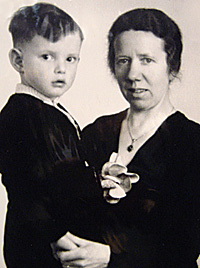By Stacey Palevsky, other
Hermanna Van Corbach de Vries did two heroic things during World War II.
First, she agreed to hide a 9-month-old Jewish boy. And then, three years later, she gave him back to his relatives.
“Hers was a love so great that even the horrors of war could not fracture it,” said Gideon Lustig, deputy Israeli consul general, during a Feb. 19 ceremony at the Israeli consulate that honored de Vries for her efforts and officially recognized her as Righteous Among the Nations.
About 22,000 people worldwide hold such a title — which is conferred by Yad Vashem, Israel’s Holocaust memorial — and receive a medal of honor as a “sign of thanks from the Jewish people,” which is engraved in Hebrew on the bronze medallion.
Doris Gill, de Vries’ great-niece, flew to San Francisco from Sunnyside, in Eastern Washington, to accept the award on her great-aunt’s behalf. About 40 people — including five Holocaust survivors — attended the ceremony at the consulate, which serves all of the Pacific Northwest.
De Vries died in 1967 in the Netherlands. The recognition “is almost like a dream come true,” Gill said during an interview before the ceremony.
Gill and a friend worked for several years to gather enough documentation to verify de Vries’ brave efforts.
“He assured me that God would not let this story dry up,” Gill said. “I believed that. I believed that we’d eventually have a piece of family history that we could pass on to our children about the value of life — of protecting and guarding and defending it.”
Hermanna van Corbach de Vries was born in 1901 and lived in the eastern district of Overijssel in the Netherlands. She married her husband in 1940. Two years later, she was a widow.
The following year, in March 1943, an underground Dutch resistance group knocked on her door. Would she safeguard a Jewish baby boy, Andy Ijzerman, and care for him as though he was her own?
Andy’s parents, Machiel and Marie Ijzerman, worried about going into hiding with their son, and decided it would be safest to hide him in a separate location. They wrote a letter to their baby and enclosed it in a small suitcase containing a few other items. It explained their predicament and expressed their love.
“To hand over a child to strangers must have been an excruciating choice,” Gill said during a speech at the awards ceremony.
Within weeks, Machiel and Marie were discovered, sent to the death camps and murdered.
De Vries raised Andy for nearly three years. She nourished him, loved him, protected him.
Then came a knock at the door. It was Andy’s uncle, Gerrit Trompetter, who had survived the Holocaust. After liberation, he spent months searching the Netherlands for his surviving family. When he finally found Andy, he wanted him back.
“She had grown so attached to him,” Gill said. “She postponed giving him back for weeks. It took some convincing by her family members that giving him back was the right thing to do.”
And so, “in an act of equal heroism,” said Consul General Akiva Tor, de Vries achingly parted with the young boy, whom she had come to love as though he was her own son.
Gerrit and his wife adopted Andy and with their biological son, Jack, moved to the United States in 1948. The Trompetters stayed in touch with de Vries, who came to visit them in the 1950s.
Andy Trompetter flew to the Netherlands in 1965 to see his quasi-mother. The two continued to think of one another as family.
Andy eventually married and divorced, and made a name for himself in puppetry. In 1979, at the age of 37, he died suddenly of a heart attack.
